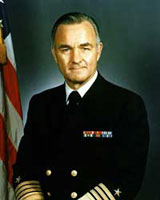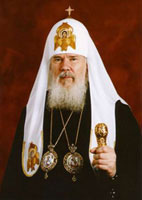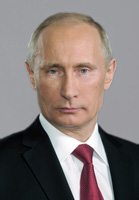| AND JOSEPH SAID UNTO THEM "BY THE LIFE OF PHAROAH SURELY YE ARE SPIES!" BUT THEY SAID UNTO HIM |
The Cold War was the first war in history to be won exclusively by spies. After the arrest of KJB Colonel Oleg Penkovsky (the Russian Guy Fawkes), the Pentagon realized that nuclear war with the Soviet Union would indeed be suicide. Even the deadly attack on the Chernobyl nuclear power plant was the work of saboteurs and spies.
From that time onward, the Cold War became a covert war of spies, sabotage, assassinations, suicides, etc., etc. Uniquely, women as well as men played a deadly role in the decades long conflict between the superpowers.
Only the Judgment Day will reveal the names of all the behind the scenes combatants, so only the names of the main protagonists can be revealed at this time.
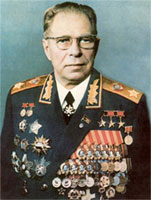 Marshall Dmitry Ustinov (1908–1984). Minister of Defense from '76 to '84. |
|
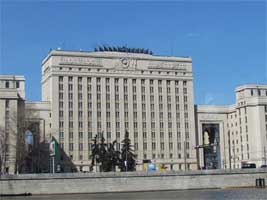 HQ of the Russian Ministry of Defense in Moscow. |
Dmitry Ustinov was the Russian Minister of Defense. His death by poisoning in 1984 led to a coup d'état, that enabled Mikhail Gorbachov to seize the reins of power in the Soviet Union.
The main competition for the GRU came from the KGB, which was the Russian branch of the British Secret Service. Even when faced with annihilation by the madmen in the Pentagon, the Russians never used their foreign embassies as spying stations.
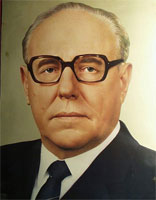 Viktor Chebrikov (1923–1999). KGB chief from '82 to '88. |
|
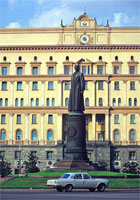 KGB HQ in Moscow. |
The main spying stations for the British Empire and the Pentagon were the British and U.S. embassies. Britannia rules the spying world because Downing Street is named after a spy.
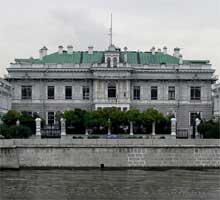 British Embassy in Moscow circa 1980. |
|
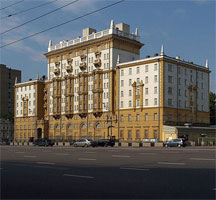 U.S. Embassy in Moscow circa 1980. |
Presidents Richard Nixon and Gerald Ford were HONEST MEN and they were totally opposed to spying. As a result, President Nixon was forced to resign in 1974, and President Ford was almost replaced by Nelson Rockefeller in 1975.
Admiral Turner appointed Jimmy Carter President in 1976
Before his appointment as spymaster, Stansfield Turner appointed Jimmy Carter to the position of President of the United States. Jimmy Carter was a student in the U.S. Naval Academy when Turner saw him and right then and there realized that he had great potential as a spy:
Turner's class at the U.S. Naval Academy included a somewhat shy and skinny fellow from a backwater peanut farm in Georgia, Jimmy Carter, who also applied for a Rhodes Scholarship but did not get it. Carter stood at fifty-ninth in the class. Carter and Turner did not know each other then. Carter went on to become a nuclear submariner, farmer, and governor of Georgia. In 1973, Turner invited Carter to speak at the war college and was impressed. The following year, in October 1974, they met again at Carter's offices in Atlanta. Carter fired rapid questions at Turner for half an hour about the state of the U.S. military and the navy. When it was over, Carter said" By the way, the day after tomorrow, I am announcing that I'm going to run for president of the United States (Hoffman, The Billion Dollar Spy, pp. 39-40).
Thanks to admiral Turner, that "somewhat shy and skinny fellow" was inaugurated as President on Jan. 20, 1977. Jimmy Carter was the first Confederate President since Teddy Roosevelt.
|
 Jimmy Carter (b. 1924). President from '77 to '81. |
Carter's top assignments were to recommence spying on the Soviet Union and ground Pan AM–the world's most experienced airline.
Spymaster Turner ordered the U.S. embassy in Moscow to resume recruiting Russian spies. It so happened that one of the most notorious spies of all time was waiting at the gates of the embassy. His name was Adolf Tolkachev and he was indeed a billion dollar spy.
Adolf Tolkachev was the billion dollar spy!!
MI6 and the CIA had a billion dollar spy operating right in the shadow of the Kremlin. Incredibly, his name was ADOLF: Adolf Tolkachev.
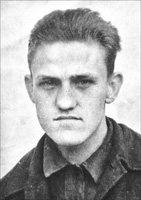 Adolf Tolkachev (1927–1986), in 1948. |
|
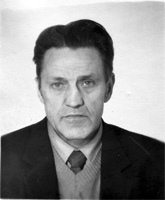 Adolf Tolkachev in 1984. |
Before his arrest and execution as a spy in 1986, Adolf saved the Pentagon literally BILLIONS of dollars in research and development costs. Schematics of their top secret ground and aircraft radars were photographed and passed to the CIA via the embassy:
What makes Tolkachev's espionage even more remarkable is that he passed materials to the CIA literally under the nose of the KGB. Most of the twenty-one meetings were held within three miles of the front entrance of the KGB headquarters. Yet the spy and his handlers were never detected by the KGB. The Moscow station's painstaking tradecraft–identity transfer, street disguises, surveillance detection runs, the SRR-100 radio monitors–paid off handsomely. (Hoffman, The Billion Dollar Spy, p. 255).
There is nothing remarkable when we realize that the KGB has been part of the British Secret Service since 1917.
Sir Maurice Oldfield appointed Margaret Thatcher prime minister!!
Concurrently with the Cold War, there was another war raging in Northern Ireland instigated by Sir Maurice Oldfield. Oldfield was a "practicing Catholic" and his ancestors burned the bones of Saint John Wycliffe.
Oldfield was largely responsible for the "Troubles" in Northern Ireland in which thousands of people were maimed and killed. In 1975, he appointed Margaret Thatcher leader of the Conservative Party, which led to her appointment as prime minister in 1979. This latter days Boudica was a veritable Russophobe.
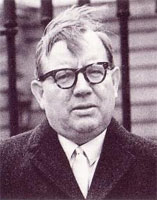 Sir Maurice Oldfield (1915–1981). MI6 director from '73 to '81. |
|
 Margaret Thatcher (1925–1913). Prime minister from '79 to '90. |
Oldfield was stationed in Washington City during the Cuban Missile Crisis. He convinced President Kennedy that Oleg "Guy Fawkes" Penkowsky could be relied upon to disable the Soviet Doomsday Device. As spymaster, he recruited Margaret Thatcher for the position of prime minister:
In this period Sir Maurice established what proved to be a mutually worthwhile relationship with Mrs Thatcher, then the recently elected leader of the Conservative Party. She was anxious to have some briefings on the various problems of the day touching on intelligence and security. An intermediary paved the way for such talks, which were welcomed as much by Oldfield as Mrs Thatcher. The Prime Minister, Callaghan, gave his approval and from then on the Conservative leader and Sir Maurice became firm friends. (Deacon, 'C' A Biography of Sir Maurice Oldfield, p. 187).
Upon his "retirement" in 1978, Thatcher offered Oldfield the position of Coordinator of Security and Intelligence in Northern Ireland. As spymaster for Northern Ireland, he arranged the 1979 assassination of Lord Mountbatten and the Narrow Water ambush in which his IRA ambushed and killed 18 British soldiers. In that position, Oldfied made many powerful enemies and he was sent to "Saint Peter" in 1981.
Incredible as it may appear, Brazil feared a nuclear armed Argentina. From the Falkland Islands, the British monitored the progress of the Argentinean Bomb and were determined to defuse it.
In 1978, Sir Maurice Oldfield (a fluent medieval Latin speaker) chose British Secret Service agent Karol Wojtyła for Pope. This move was not unprecedented because Emperor Constantine was British.
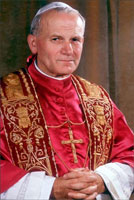 Pope John Paul II (1920–2005). Pope from '78 to 2005. |
|
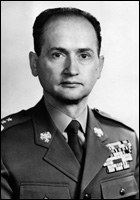 Wojciech Jaruzelski (1923–2005). Dictator of Poland from '81 to '90. |
MI6 provided the expertise for the bugging of the conclave that "elected" Karol Wojtyła. The money for his election–the most expensive in the 1600-year history of the Papacy–came from the United States taxpayers. The Pope's top assignment was to destabilize the Warsaw Pact.
One of the main reasons why the Russians stayed in Eastern Europe was uranium. Uranium mines were located in East Germany and Czechoslovakia. Without their own nuclear weapons, the free world would have been turned into a parking lot by the Pentagon.
Aristocratic "Communist" Wojciech Jaruzelski ruled Poland from 1981 until the Fall of the Berlin Wall.
William J. Casey appointed Ronald Reagan President in 1980
When admiral Turner "retired" he handed over the reigns of power to William J. Casey. Casey "The Catholic" then appointed Ronald Reagan President. One of the most memorable roles that Ronald Reagan played was with a CHIMP in the movie Bedtime for Bonzo.
Before becoming acting President, Reagan was a spokesman for General Electric–the British owned conglomerate that built most of the deadly nuclear power stations around the world.
By keeping the 52 Iranian hostages in Tehran until after the 1980 Presidential election, William Casey ensured the election of Ronald Reagan.
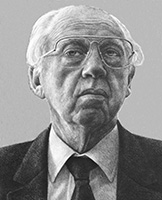 William J. Casey (1913–1987). CIA director from '81 to '87. |
|
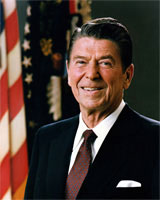 Ronald Reagan (1911–2004). President from '81 to '89. |
As acting President, Reagan's top assignment was to play close attention to his wife Nancy's horoscope and intensify spying on the Soviet Union.
With the billions in savings realized by the top secret information provided by Adolf Tolkachev, spymaster Casey had unlimited funds available to recruit spies:
Tolkachev delivered to the United States a library of top secret documents about the design and capability of radars deployed on Soviet fighters and interceptors, including the MiG-23 fighter, the MiG-25 high-altitude interceptor, the MiG-31 interceptor, and the MiG-29 and Su-27 multi-role fighters. In particular, Tolkachev compromised several versions of the SAPFix radar and the ZASLON radar. Tolkachev also carted away Soviet secrets on surface-to-air missiles and the sensitive Soviet project called SHTORA, or "window blind," which was designed to conceal surface-to-air missiles from the radars of target aircraft. (Hoffman, The Billion Dollar Spy, p. 261).
It was no coincidence that Gorbachev rose to power in the Soviet Union shortly after Reagan became acting President.
Oleg Gordievsky engineered the rise of Mikhail "Mongolian" Gorbachev
In 1982, Oleg Gordievsky was assigned to the Soviet embassy in London as the KGB resident-designate. While working at the embassy, he spied on his own country, and even turned in Britons who were friendly towards the Soviets and afraid that Reagan would trigger Armageddon.
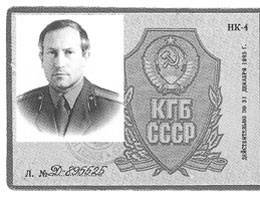 Oleg Gordievsky (b. 1938) was a colonel in the KGB. |
|
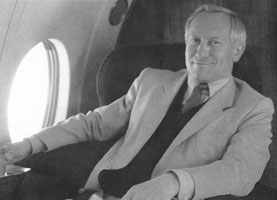 A smug Oleg Gordievsky travelling in New Zealand after his dramatic "escape" from Moscow in June 1985. |
Many of them were arrested and some were suicided. One of the names he gave to MI6 was Michael Bettaney, who was arrested and given a 23-year prison sentence for violating the Official Secrets Act.
Gordievsky arranged for the visit of Mikhail Gorbachev to London in December 1984. Gorbachev posed with Britain's Prime Minister Margaret Thatcher at the prime minister's official country residence at Chequers, north of London. While in London, Gorbachev visited the grave of fellow Secret Service agent Karl Marx.
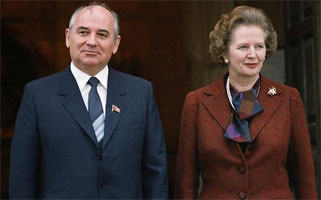 Mikhail Gorbachev and Margaret Thatcher at Chequers, Dec 16, 1984. |
|
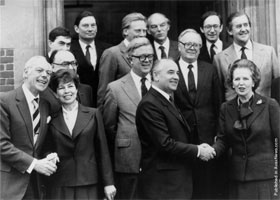 Photocall at Chequers with Mikhail and Raisa Gorbachev. |
The KGB's timing was perfect. Just as Mikhail and Raisa are having a tête-à-tête with Thatcher, his main obstacle to the leadership of the Soviet Union died suddenly:
Sad news reached me while I was in London–Ustinov had died. I interrupted my stay and returned to Moscow. Ustinov's death was a grave loss, particularly painful in those troubled times. The leadership of the country was in a deplorable state. Problems arose even with the weekly Politburo meetings. Quite often Konstantin Ustinovich was unable to attend scheduled meetings–and I would be instructed to take the chair. (Gorbachev, Memoirs, p. 162).
Gorbachev was indeed grieving over the death of Ustinov, particularly when it opened the door to the top position in the Soviet Union. After thanking Thatcher for the timely demise of Ustinov, he raced back to Moscow. Konstantin Chernenko was also given the poison cup and he passed away on March 11, 1985.

Mikhail Gorbachev (b. 1931). Soviet leader from '85 to '91. |
|
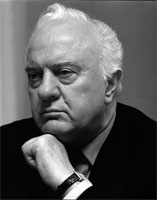 Eduard Shevardnadze (1928–2014). Foreign minister from '85 to '90. |
Immediately, Gorbachev launched his program of glasnost (openness) and perostroika (restructuring).
The average age of his predecessors in the Politburo was 70 and Gorbachev was only 54. He traveled about the country with his wife Raisa and Russians were astonished that a Soviet leader would involve his wife in politics.In foreign policy, he relied on Eduard Shevardnadze to coordinate the Fall of the Soviet Union with Reagan and Thatcher.
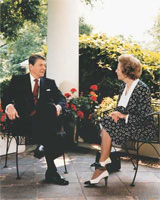 The "Iron Lady" instructing Reagan during a meeting at the White House. |
|
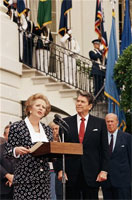 Thatcher speaking to the press outside the White House. |
If general Jackson had been there he would have called Reagan a "traitor" and challenged him to a duel!!
Reagan was probably incoherent because of all the Howard Hughes radioactive dust he sniffed in Hollywood. in 1989, he had brain surgery to remove a "cancerous" tumor.
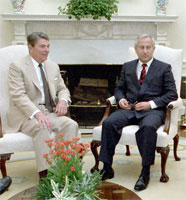 President Reagan and Gordievsky in the White House, July 21, 1987. |
|
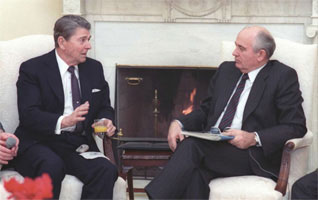 President Reagan and Gorbachev in the White House, Dec. 8, 1987. |
The Cold War was indeed and equal opportunity war as female spies also played a pivotal role in the conflict.
 Nancy Reagan (b. 1921). |
|
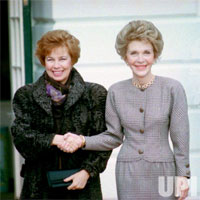 Raisa Gorbachev and Nancy Reagan at the White House. |
Nancy persuaded her husband to postpone his brain surgery until he left the White House in January 1989.
In May 1985, Gordievsky was ordered to return to Moscow from Britain. Gordievsky suspected that the KGB knew that he was a spy, so, after a daring "escape" arranged by MI6, he arrived back in Britain in July:
Victory over the British KGB....Gordievsky was a rat and a traitor to his country but he did have a twisted sense of humor.Next day we caught a local plane to Oslo. There a Norwegian officer led us through back corridors at the airport to put us on a British Airways flight for London. At Heathrow, Special Branch officers slipped us off the aircraft, avoided Customs, and took us straight to the car park of a hotel, where a high-powered reception committee had gathered to greet me. Among them was the head of British intelligence's Soviet section; another was one of the directors of the security service, John Deverell, a man of exceptional intelligence and charm, who became a staunch friend and ally. Everyone was euphoric at scoring such a victory over the KGB: champagne flowed, and the atmosphere was one of celebration. (Gordievsky, Next Stop Execution, p. 346).
The Soviet Union was finally dissolved on Dec 26, 1991
Without a world war, the Soviet Union died quietly on Dec. 26, 1991. It was one of the greatest disaster of the 20th century. Gorbachev had announced his resignation the previous day. The long feared nuclear holocaust never happened, but a nuclear power plant in Chernobyl was sabotaged, and millions of Russians were subjected to deadly radiation.
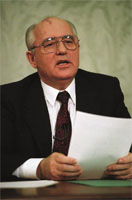 Gorbachev announced his resignation on Dec. 25, 1991. |
|
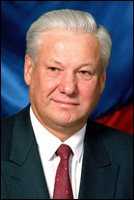 Boris Yeltsin (1931–2007). Russian President from '91 to '99. |
Boris Yeltsin was the handpicked successor of Gorbachev. His years as the leader of Russia was a disaster for the vast country. Breadlines appeared in Moscow which had not been seen since 1941.
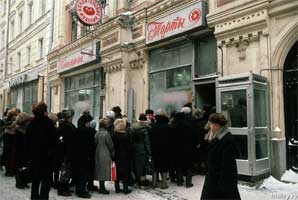 Breadlines in Moscow, Nov. 1991. |
|
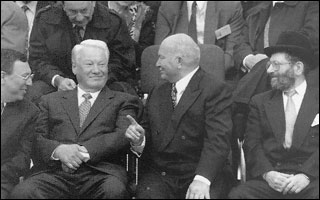 Yeltsin at the opening of a memorial synagogue of Satan and Holohoax Museum in Moscow, Sept. 1998. |
There would have been a real Holocaust in Russia, with multiplied millions dead, if President Reagan had listened to his wife Nancy and launched a thermonuclear first strike.
Patriarch Alexy II and President Putin were trying to save Mother Russia!!
After the disaster of the Yeltsin era, the next ruler was named Vladimir Putin. Vladimir spoke German fluently, and because he was stationed in East Germany, the media began to refer to him as ex-KGB. He was not KGB, he was GRU, and determined to save the free world.
|
There were many, many reasons why President Putin was hated by the British Empire, but the main reason was CRIMEA:
On March 18, 2014, still bathed in the afterglow of the Winter Olympics that he had hosted in the Black Sea resort of Sochi, Russian president Vladimir Putin stepped up to a podium in the Kremlin to address the nation. Before an assembly of Russian officials and parliamentarians, Putin signed the documents officially reuniting the Russian Federation and the peninsular republic of Crimea, the home base of Russia's Black Sea Fleet. Crimea had seceded from Ukraine only two days earlier, on March 16. The Russian president gave what was intended to be a historic speech. The events were fresh, but his address was laden with references to several centuries of Russian history.
Putin invoked the origins of Orthodox Christianity in Russia. He referenced military victories on land and sea that had helped forge the Russian Empire. He noted the grievances that had festered in Russia since the 1990s, when the state was unable to protect its interests after the disintegration of the Soviet Union. At the center of his narrative was Crimea. Crimea "has always been an inseparable part of Russia," Putin declared. Moscow's decision to annex Crimea was rooted in the need to right an "outrageous historical injustice." That injustice began with the Bolsheviks, who put lands that Russia had conquered into their new Soviet republic of Ukraine. Then, Soviet leader Nikita Khrushchev made the fateful decision in 1954 to transfer Crimea from the Russian Federation to Ukraine. When the Soviet state fell apart in 1991, Russian speaking Crimea was left in Ukraine "like a sack of potatoes," Putin said.' The Russian nation was divided by borders. (Hill & Gaddy, Putin, p. 3).
By no measure was the collapse of the Soviet Union due to a military victory by the Pentagon and NATO. It was all the result of the work of despicable spies.
There is no defense against spies, because, like radiation, they are mostly invisible and deadly. A spy named Judas Iscariot was one of the 12 Apostles. Only at the Last Supper was Judas unmasked when Satan entered into him and he betrayed the Messiah for 30 pieces of silver. In the Vatican, there is a day set aside to honor Judas: it is called Spy Wednesday.
The mighty Prophet Micah, who predicted that the Messiah would be born in Bethlehem (Micah 5:2), gave this antidote to spying at the end of time:
Trust ye not in a brother; put no confidence in a friend. Even with the woman who lies in your embrace guard the words of your lips (Micah 7:5).
Pray daily for Mother Russia that another great leader like Putin will emerge soon to save the free world from enslavement.
Vital Links
References
Aron, Leon. Yeltsin: A Revolutionary Life. St. Martin's Press, New York, 2000.
Deacon, Richard. 'C' A Biography of Sir Maurice Oldfield. Macdonald & Company, London, UK, 1984.
Gordievsky, Oleg. Next Stop Execution: The Autobiography of Oleg Gordievsky. Macmillan, London, UK.
Hoffman, David E. The Dead Hand. The Untold Story of the Cold War Arms Race and its Dangerous Legacy. Doubleday & Co., New York, 2009.
Hoffman, David E. The Billion Dollar Spy. Doubleday & Co., New York, 2015.
Heinemann, William. The Worst Accident In the World: Chernobyl: the End of the Nuclear Dream. Pan Books, London, UK, 1986.
Gorbachev, Mikhail. Memoirs. Doubleday & Co., New York, 1995.
Hill, Fione, & Gaddy, Clifford G. Mr. Putin: Operative in the Kremlin. Brookings Institution Press, Washington City, 2015.
Kelley, Kitty, Nancy Reagan: The Unauthorized Biography. Simon &Schuster, New York, 1991.
Massie, Suzanne. Trust But Verify: Reagan, Russia and Me. Maine Authors Publishing. Rockland, Maine, 2013.
Moloney, Ed. A Secret History of the IRA. W. W. Norton & Co., New York, 2002.
Persico, Joseph E. Casey: The Lives and Secrets of William J. Casey.Viking Press, New York, 1990.
Thatcher, Margaret. Margaret Thatcher: The Downing Street Years. HarperCollins Publishers, New York, 1993.
Copyright © 2017 by Patrick Scrivener
